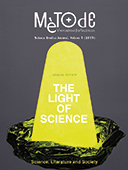La falta de reproducibilidad de la investigación: La estadística como legitimación del resultado
DOI:
https://doi.org/10.7203/metode.0.3913Palabras clave:
evidencia estadística, test de hipótesis, análisis bayesiano, test bayesianos uniformemente más potentes Resumen
Resumen
La investigación científica se legitima mediante la replicación de sus resultados, pero los esfuerzos por replicar afirmaciones engañosas agotan la financiación. Nos centraremos en una de las causas de esos errores: los resultados de pruebas estadísticas que ofrecen falsos positivos debido al azar. Los métodos estadísticos clásicos confían en los p-valores para ponderar las pruebas frente a una hipótesis nula, pero las pruebas de hipótesis bayesianas ofrecen resultados más fáciles de comprender, siempre que uno pueda especificar distribuciones a priori para la hipótesis alternativa. Describiremos nuevas pruebas, los UMPBT, test bayesianos que ofrecen una especificación por defecto de las alternativas a priori, y mostraremos que estos test también maximizan la potencia estadística.
 Descargas
Descargas
 Citas
Citas
Begley, C. and L. Ellis, 2012. «Drug Development: Raise Standards for Preclinical Cancer Research». Nature, 483(7391): 531-533. DOI: <10.1038/483531a>.
Bem, D., 2011. «Feeling the Future: Experimental Evidence for Anomalous Retroactive Influences on Cognition and Effect». Journal Personality and Social Psychology, 100(3): 407-425. DOI: <10.1037/a0021524>.
Bem, D.; Utts, J. and W. Johnson, 2011. «Must Psychologists Change the Way They Analyze Their Data?». Journal Personality and Social Psychology, 101(4): 716-719. DOI: <10.1037/a0024777>.
Berger, J. and T. Sellke, 1987. «Testing a Point Null Hypothesis: Irreconcilability of -values and Evidence». Journal of the American Statistical Association, 82(397): 112-122. DOI: <10.2307/2289131>.
Edwards, W.; Lindman, H. and L. Savage, 1963. «Bayesian Statistical Inference for Psychological Research». Psychological Review, 70(3): 193-242. DOI: <10.1037/h0044139>.
Hirschhorn, J.; Lohmueller, K.; Byrne, E. and K. Hirschhorn, 2002. «A Comprehensive Review of Genetic Association Studies». Genetics in Medicine, 4(2): 45-61. DOI: <10.1097/00125817-200203000-00002>.
Johnson, V. E., 2013a. «Uniformly Most Powerful Bayesian Tests». The Annals of Statistics, 41(1): 1716-1741. DOI: <10.1214/13-AOS1123>.
Johnson, V. E., 2013b. «Revised Standards for Statistical Evidence». PNAS, 110(48): 19313-19317. DOI: <10.1073/pnas.1313476110>.
Prinz, F.; Schlange, T. and K. Asadullah, 2011. «Believe It or Not: How Much Can We Rely on Published Data on Potential Drug Targets?». Nature Reviews Drug Discovery, 10(9): 712. DOI: <10.1038/nrd3439-c1>.
Rouder, J. and R. Morey, 2011. «A Bayes Factor Meta-analysis of Bem’s ESP Claim». Psychonomic Bulleton and Review, 18(4): 682-689. DOI: <10.3758/s13423-011-0088-7>.
Sellke, T.; Bayarri, M. and J. Berger, 2001. «Calibration of p-values for Testing Precise Null Hypotheses». The American Statistician, 55(1): 62-71. DOI: <10.1198/000313001300339950>.
Wagenmakers, E.; Wetzels, R.; Borsboom, D. and H. van der Maas, 2011. «Why Psychologists Must Change the Way they Analyze Their Data: the Case of Psi: Comment on Bem (2011)». Journal of Personality and Social Psychology, 100(3): 426-432. DOI: <10.1037/a0022790>.
Publicado
Cómo citar
-
Resumen905
-
PDF (Català)281
-
PDF139
-
PDF 120
Número
Sección
Licencia
![]()
Todos los documentos incluidos en OJS son de acceso libre y propiedad de sus autores.
Los autores que publican en esta revista están de acuerdo con los siguientes términos:
- Los autores conservan los derechos de autor y garantizan a Metode Science Studies Journal el derecho a la primera publicación del trabajo, licenciado bajo una licencia de Creative Commons Reconocimiento-NoComercial-SinObraDerivada 4.0 Internacional, que permite a otros compartir el trabajo con un reconocimiento de la autoría del trabajo y citando la publicación inicial en esta revista.
- Se permite y se anima a los autores a difundir sus trabajos electrónicamente a través de páginas personales e institucionales (repositorios institucionales, páginas web personales o perfiles a redes profesionales o académicas) una vez publicado el trabajo.





